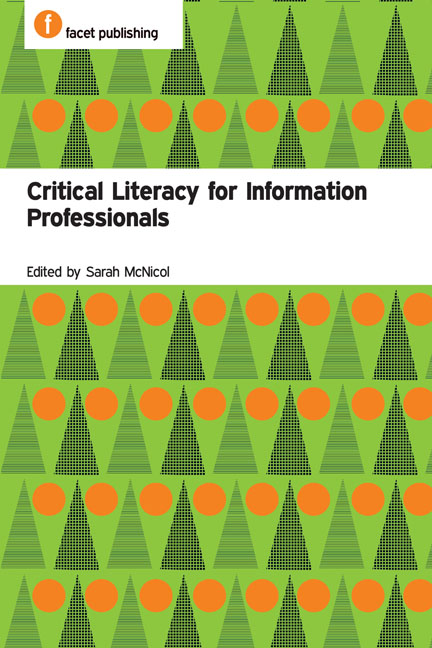Book contents
- Frontmatter
- Contents
- Contributors
- Introduction
- PART 1 THEORIES OF CRITICAL LITERACY
- 1 Renegotiating the place of fiction in libraries through critical literacy
- 2 Death of the author(ity): repositioning students as constructors of meaning in information literacy instruction
- 3 Reading health-education comics critically: challenging power relationships
- 4 Reframing librarians’ approaches to international students’ information literacy through the lens of New Literacy Studies
- 5 Using new literacies to discuss disability in the library
- 6 ‘Anyone can cook’: critical literacy in the workplace
- 7 Social justice, adult learning and critical literacy
- PART 2 CRITICAL LITERACY IN PRACTICE
- Further information
- Index
7 - Social justice, adult learning and critical literacy
from PART 1 - THEORIES OF CRITICAL LITERACY
Published online by Cambridge University Press: 08 June 2018
- Frontmatter
- Contents
- Contributors
- Introduction
- PART 1 THEORIES OF CRITICAL LITERACY
- 1 Renegotiating the place of fiction in libraries through critical literacy
- 2 Death of the author(ity): repositioning students as constructors of meaning in information literacy instruction
- 3 Reading health-education comics critically: challenging power relationships
- 4 Reframing librarians’ approaches to international students’ information literacy through the lens of New Literacy Studies
- 5 Using new literacies to discuss disability in the library
- 6 ‘Anyone can cook’: critical literacy in the workplace
- 7 Social justice, adult learning and critical literacy
- PART 2 CRITICAL LITERACY IN PRACTICE
- Further information
- Index
Summary
Introduction
Adult learners, also called mature learners, are a nebulous group. The United States National Center for Education Statistics (NCES, n.d.) defines ‘adult education’ as any formal learning activities done by people over 16 years old. In the UK, the National Research and Development Centre for Adult Literacy and Numeracy (2010, 6) expands the definition of adult learning to ‘the entire range of formal, non-formal and informal learning activities which are undertaken by adults after a break since leaving initial education and training, and which results in the acquisition of new knowledge and skills’. Other definitions are based solely on age; many institutions of higher education, including Roosevelt University (2014a) in Chicago, Illinois, consider their adult degree programme to be for students over 24 years old. In 2013, roughly 31% of students enrolled in degree-granting post-secondary institutions in the United States were 25 or older and therefore fell into the group commonly thought of as ‘adult students’ (NCES, 2015). Because this article is grounded in the context in which I work, it primarily focuses on students enrolled in higher education in the United States who are 24 or more years old. However, it is important to remember that not all 24-year-olds have the same challenges and opportunities, and students younger than this may exhibit similar behaviours, motivations or circumstances. There are no rigid lines when defining adult learners, and inflexible definitions are in fact not terribly meaningful because adult education and learning theorists can be informative for information professionals about helping learners of all ages.
I approach the examination of adult learning and critical literacy from the perspective of an academic librarian and instructor. I was a librarian at the Roosevelt University Library from 2007 to 2010 and, since 2008, I have also been teaching online courses in Roosevelt's adult accelerated degree programme (now called the Flex-Track Program). This chapter starts with an overview of Roosevelt University and its philosophy of and approach to socialjustice, in particular as part of its Flex-Track Program. It then explores how, within this framework, three adult learning theories have been influential, both within formal, taught academic-skills courses and in more ad hoc library support. The final section reflects on some of the potential challenges facing tutors and library professionals wishing to incorporate such approaches into their work.
- Type
- Chapter
- Information
- Critical Literacy for Information Professionals , pp. 79 - 90Publisher: FacetPrint publication year: 2016
- 1
- Cited by

